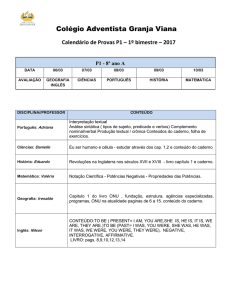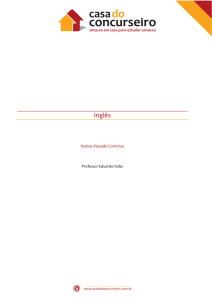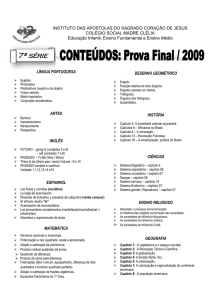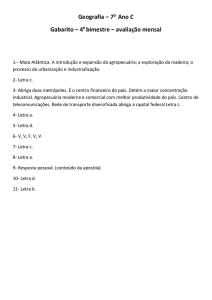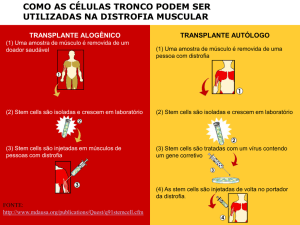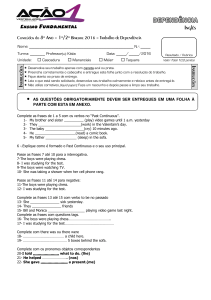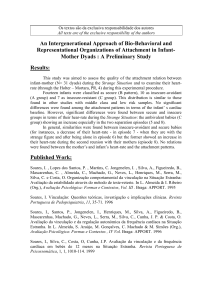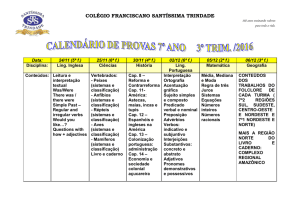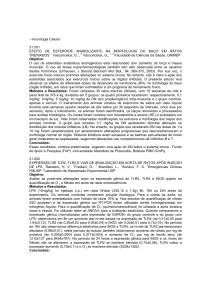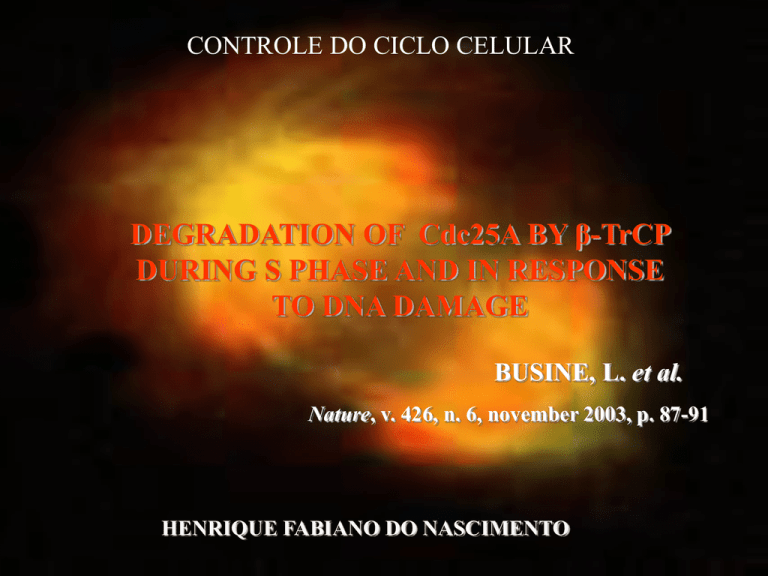
CONTROLE DO CICLO CELULAR
DEGRADATION OF Cdc25A BY β-TrCP
DURING S PHASE AND IN RESPONSE
TO DNA DAMAGE
BUSINE, L. et al.
Nature, v. 426, n. 6, november 2003, p. 87-91
HENRIQUE FABIANO DO NASCIMENTO
Introdução:
► Cdc25A fosfatase é essencial para a progressão do ciclo celular
por causa de sua função de desfosforilar cdks (B/cdc2).
► Em resposta a danos no DNA ou falência da replicação, as ATM e
ATR proteínas cinases ativam as checkpoint cinases Chk1 e Chk2 que
levam a hiperfosforilação do Cdc25A. Estes eventos estimulam a
proteólise da Cdc25A mediada por ubiquitina e contribuem para o
atraso do ciclo celular, prevenindo a instabilidade genômica.
► β-TrCP é uma proteína F-box que fosforila Cdc25A para degradação
pelo complexo protéico Skp1/Cul1/F-box (SCF).
► Downregulation da expressão de β-TrCP1 e β-TrCP2 causa um
acúmulo de Cdc25A nas células em fase S e previne a degradação
de Cdc25A induzida por radiação ionizante, indicando que β-TrCP
pode funcionar em checkpoint dentro da fase S.
B
cdc2 p
cdc25
KEN BOX
SC
B
cdc2
Fator promotor de anáfase (APC) ou ciclossomo
Mitose
cdc25
KEN BOX
ubiquitina
SC
p
F-box
(SCF)
degradação pós-mitose
(senão como formar MPF “inativo” para o outro ciclo?)
SC
KEN BOX
ubiquitina
resiste a APC, mas é lábil e degradada em resposta a UV
(checkpoint, mas qual mecanismo então??)
Metodologia
► Culturas de células, sincronização e transfecção;
► Plasmídios (Flag- e His- tagged Cdc25A mutantes);
► Imunoblotting, imunopreciptação e tratamento com fosfatase;
► Ensaio de ligação com peptídeo;
► Ubiquitinação in vivo;
► siRNA;
► Ensaio de síntese de DNA radio-resistente.
Resultados:
Únicas que interagem com
Cdc25A in vivo
alguma F (do SCF) se liga in vivo a
cdc25? Qual??
•Céls HeLa + F com “flag”
•Imunoprecip com anti-flag
•WB revelado com anti-cdc25
ou com anti-C, ou anti-flag (controle)
Figure 1 Cdc25A interacts with -TrCP1 and -TrCP2 in
vivo. a, HeLa cells were transfected with the indicated
Flag–tagged F-box protein constructs. F-box proteins
were immunoprecipitated from extracts with an antiFlag resin and immunocomplexes were blotted with
antibodies specific for Cul1, Cdc25A and Flag. b, HeLa
cells were co-transfected with a vector expressing His–
Cdc25A plus the indicated Flag-tagged F-box protein
constructs. Immunocomplexes were analysed as in a.
WCE, whole-cell extract. Asterisk indicates the position
of the IgG heavy chain (-TrCP2 protein overlaps with
IgG). c, Cdc25A bound to -TrCP proteins is
phosphorylated. Immunocomplexes obtained by -TrCP1
immunoprecipitation were treated with -phosphatase
and analysed for Cdc25A.
hiperfosforilação
•Céls HeLa + cdc25a com flag (6 his)
•Imunoprecip com anti-his
•WB revelado com anti Fs
•OPS: cdc25 fosforilada! (IP anti-F)
► A sequência de aminoácidos de Cdc25A contém um motivo
DSGXXXXS (DSG(X)4S)
► Que é similar com os motivos DSGXXS ou DSGXXXS
presentes em conhecidos substratos do complexo SCF β-TrCP .
► Fosforilação em ambas serinas é necessária para a ligação com βTrCP e consequentq degradação.
► Substituição de duas serinas por alaminas abole a interação
deCdc25A com β-TrCP . Esta interação é provavelmente dependente
da fosforilação dos resíduos de serina (fig. 2b).
Resultados:
Mutantes
são mais
estáveis
Ubiquitinação
Fosforilação é requerida p/ a degradação
Figure 2 Interaction with -TrCP protein through a
phosphorylated DSG motif is required for Cdc25A degradation
and polyubiquitination. a, Alignment of DSG motifs identified in
known -TrCP substrates. Serine-to-alanine mutations in the DSG
motif of Cdc25A are boxed. b, Vectors expressing His-tagged
Cdc25ADSG2 and Cdc25ADSG3 were coexpressed with Flag–-TrCP1
in HeLa cells, and anti-Flag immunocomplexes were blotted for
Cdc25A. c, Immobilized Cdc25A-derived peptides, with or
without phosphorylation on Ser 82 and Ser 88 (a), were incubated
with [35S]methionine-labelled in vitro translated F-box proteins
(IVT) and analysed by autoradiography. d, HeLa cells were
transfected with the indicated Flag-tagged constructs and
analysed for Cdc25A expression after cycloheximide (CHX)
treatment. e, [35S]methionine-labelled in vitro translated Cdc25A
was incubated with HeLa cell extract enriched with the indicated
Skp1–F-box protein complexes and analysed by autoradiography.
f, The ATP analogue AMP-PNP was used in the ubiquitin ligation
reaction. g, -TrCP-mediated ubiquitination of wild-type Cdc25A
and the Cdc25ADSG3 mutant.
Resultados:
Cdc25 Ken = mutante que não é
degradado pelo complexo APC/C
G1/S
M/G1
Figure 3 -TrCP controls Cdc25A abundance during
progression of S phase. a, HeLa cells were mock-transfected
or transfected with -TrCP1 and -TrCP2 siRNA
oligonucleotides. Expression of Cdc25A and -TrCP1/2
(analysed by immunoblotting and quantitative PCR) is
shown. b, Cells transfected as indicated were synchronized by
double-thymidine block and released in nocodazolecontaining medium. Cells were collected at the indicated time
points, lysed and immunoblotted for Cdc25A, Emi1 and
cyclin A. Samples collected at the T0, T6 an T12 time points
were aligned for a direct comparison of Cdc25A expression.
c, Cells transfected as indicated were synchronized by
nocodazole treatment and released in drug-free medium.
Cells were analysed for Cdc25A, Emi1 and cyclin B1 as in b.
d, Cells transfected with a vector expressing Flag-tagged
wild-type Cdc25A or a Cdc25AKEN2 mutant were subjected to
RNA interference and analysed for overexpression of
Cdc25A.
Resultados:
Mutante: pouca
degradação após raio X
Figure 4 -TrCP is required for degradation of Cdc25A induced
by ionizing radiation in the intra-S-phase checkpoint. a, HeLa
cells were mock-transfected or transfected with -TrCP or Cdh1
siRNA and after 48 h were exposed to ionizing radiation (10 Gy).
Cdc25A protein is shown at low and high exposure. b, siRNAtransfected S-phase cells were exposed to ionizing radiation, and
the half-life of Cdc25A was analysed by cycloheximide (CHX)
treatment. c, Percentage of DNA synthesis, normalized against
mock-transfected non-irradiated cells, was assessed in mocktransfected cells and in cells transfected with -TrCP1/2 or TrCP1/2 plus Cdc25A siRNA, 90 min after ionizing radiation
treatment. d, HeLa cells overexpressing Flag–Cdc25A were
irradiated with 10 and 20 Gy in the presence of the proteasome
inhibitor MG132 and collected at the indicated time points after
irradiation. Immunoprecipitated Cdc25A was immunoblotted
with a purified anti-phosphoS82/S88 antibody. e, U2OS cells
stably expressing wild-type Cdc25A or Cdc25ADSG2 were mocktreated or treated by ionizing radiation. f, Flag-tagged Cdc25A
immunocomplexes were immunoblotted for Cdc25A, Cul1, Skp1
and -TrCP1.
Conclusões:
► É requerido dois sites de fosforilação no Cdc25A para sua
degradação por β-TrCP;
► Fosforilação nos resíduos de Serina pode estimular a degradação de
Cdc25A por facilitar a interação com componentes do SCF ou por
aumentar a habilidade do SCF para catalisar uma poliubiquitinação.

